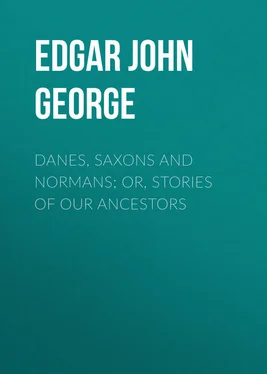John Edgar - Danes, Saxons and Normans; or, Stories of our ancestors
Здесь есть возможность читать онлайн «John Edgar - Danes, Saxons and Normans; or, Stories of our ancestors» — ознакомительный отрывок электронной книги совершенно бесплатно, а после прочтения отрывка купить полную версию. В некоторых случаях можно слушать аудио, скачать через торрент в формате fb2 и присутствует краткое содержание. Жанр: foreign_antique, foreign_prose, Историческая проза, на английском языке. Описание произведения, (предисловие) а так же отзывы посетителей доступны на портале библиотеки ЛибКат.
- Название:Danes, Saxons and Normans; or, Stories of our ancestors
- Автор:
- Жанр:
- Год:неизвестен
- ISBN:нет данных
- Рейтинг книги:5 / 5. Голосов: 1
-
Избранное:Добавить в избранное
- Отзывы:
-
Ваша оценка:
- 100
- 1
- 2
- 3
- 4
- 5
Danes, Saxons and Normans; or, Stories of our ancestors: краткое содержание, описание и аннотация
Предлагаем к чтению аннотацию, описание, краткое содержание или предисловие (зависит от того, что написал сам автор книги «Danes, Saxons and Normans; or, Stories of our ancestors»). Если вы не нашли необходимую информацию о книге — напишите в комментариях, мы постараемся отыскать её.
Danes, Saxons and Normans; or, Stories of our ancestors — читать онлайн ознакомительный отрывок
Ниже представлен текст книги, разбитый по страницам. Система сохранения места последней прочитанной страницы, позволяет с удобством читать онлайн бесплатно книгу «Danes, Saxons and Normans; or, Stories of our ancestors», без необходимости каждый раз заново искать на чём Вы остановились. Поставьте закладку, и сможете в любой момент перейти на страницу, на которой закончили чтение.
Интервал:
Закладка:
"Verily," said he, "this is a boy to be proud of. He is wonderfully like my ancestors, the old dukes of the Normans, and he must be nurtured with care."
From that time the mother and the child were dear to Duke Robert. Arlette was treated with as much state as if a nuptial benediction had been pronounced by the Archbishop of Rouen: and William was educated with more than the care generally bestowed, at that time, on the princes of Christendom. At eight he could read the "Commentaries of Cæsar;" and in after life he was in the habit of repeating a saying of one of the old counts of Anjou, "that a king without letters is a crowned ass."
It happened that, about the year 1033, Robert the Devil, reflecting on his manifold transgressions, and eager to make atonement, resolved on a penitential pilgrimage to Jerusalem. A serious obstacle, however, presented itself. The Norman nobles, with whom the descendant of Rolfganger was in high favour, on being convened, protested loudly against his departure.
"The state," they with one voice exclaimed, "will be in great peril if we are left without a chief."
"By my faith!" said Robert, "I will not leave you without a chief. I have a little bastard – I know he is my son; and he will grow a gallant man, if it please God. Take him, then, as your liege lord; for I declare him my heir, and bestow upon him the whole Duchy of Normandy."
No objections were raised to the Duke's proposal. In fact, everything seems to have gone more smoothly than could have been anticipated. William was formally presented to the assembly, and each feudal lord, placing his hand within those of the boy, took the oath of allegiance with such formalities as were customary.
Having arranged matters to his satisfaction, and placed his son under the protection of the court of France, Duke Robert took the pilgrim's scrip and staff, and, attended by a band of knights, set out for the Holy Sepulchre. On reaching Asia Minor he fell sick, and, dispensing with the company of his knights, hired four Saracens to carry him in a litter onward to Jerusalem. When approaching the Holy City, he was met by a palmer from Normandy, and waved his hand in token of recognition.
"Palmer," cried the duke, "tell my valiant lords that you have seen me carried towards Paradise on the backs of fiends."
The fate of Duke Robert was never clearly ascertained; but from his pilgrimage to Jerusalem it is certain that he did not return to Normandy. Within a year of his departure, indeed, news reached Rouen that the pilgrim-duke had breathed his last at Nice; and the Normans, though without implicitly believing the report, gradually came to think of him as one who had gone to his long home.
With news of the death of Robert the Magnificent came the crisis of the fate of "William the Bastard." Notwithstanding the oath taken with so much ceremony, the Norman barons were in no humour to submit to a boy – and to a boy, especially, who was illegitimate.
It was in vain that the guardians of young William exerted all their energies to establish his power. One pretender after another was put down by the strong hand. But the old Norman seigneurs, who had submitted with reluctance to the rule of legitimate princes, steeled their hearts against the humiliation of bending their knees to a bastard.
Among the nobles of Normandy, by far the haughtiest and most turbulent were the seigneurs of Bessi and Cotentin. These men were proud to excess of their Norwegian descent, and very tenacious of their Scandinavian traditions and customs. Indeed, they treated with something like contempt the conversion of the Normans to Christianity, carried pagan devices on their shields, and rode into battle with the old Scandinavian war-cry of "Thor aide!" Rejoicing, above all things, in the purity of their blood, these ancient seigneurs not only talked with ridicule of the idea of submitting to the son of Arlette, but formed a strong league, marshalled their fighting men, and prepared to display their banners and seize William's person.
When this conspiracy was formed, William had attained his seventeenth year, and, utterly unconscious of his danger, was residing in a castle unprepared for defence. The Counts of Bessi and Cotentin were making ready to mount their war-steeds and secure their prey, when one of their household fools stole away during the night, reached the castle where William was, clamoured for admittance in a loud voice, and would not be silenced till led to the young duke's presence. On getting audience of William, the fool hastily told him of his peril, and warned him to fly instantly.
"What say you?" asked William in surprise.
"I tell you," answered the fool, "that your enemies are coming, and, if you don't fly without delay, you'll be slain."
After some further questioning, William resolved to take the fool's advice, and mounting, spurred rapidly towards the Castle of Falaise. But he was imperfectly acquainted with the country; and he had not ridden far when he missed his way. William reined up his steed, and halted in perplexity and dismay; and his alarm was increased by hearing sounds as of enemies following at no great distance. Fortunately, at that moment, however, he met a peasant, who, by pointing out the way to the fugitive, and setting the pursuers off in a wrong direction, enabled the duke to reach Falaise in safety.
At that time, Henry, grandson of Hugh Capet, figured as King of France, and wore the diadem which his grandsire had torn from the head of the heirs of Charlemagne. In other days, Henry had been protected against the enmity of an imperious mother and a turbulent brother by Robert the Magnificent; and when William hastened to the French court, Henry, moved by the young duke's tale of distress, and remembering Robert's services, promised to give all the aid in his power. Ere long he redeemed his pledge by leading a French army against the insurgents. The result was the defeat of the rebel lords in a pitched battle at the "Val des Dunes," near Caen, and a victory which, for a time, gave security to Arlette's son on the ducal throne of Rollo.
William's youth was so far fortunate. His friends regarded him with idolatry; and his enemies, forced to admit that he seemed not unworthy of his position, became quiescent. The day on which he mounted his horse without placing foot in stirrup was hailed with joy; and the day on which he received knighthood was kept as a holiday throughout Normandy.
As time passed on, William showed himself very ambitious, and somewhat vindictive. He made war on his neighbours in Maine and Britanny on slender provocations, and resented without mercy any offensive allusion to his maternal parentage. One day, when he was besieging the town of Alençon, the inhabitants, to annoy him, beat leather skins on the walls, in allusion to the occupation of his grandfather, and shouted, "Hides, hides!" William, in bitter rage, revenged himself by causing the hands and feet of all his prisoners to be cut off, and thrown by the slingers over the walls into the town.
But, whatever William's faults, he was loved and respected by his friends. Nor could the duke's worst enemy deny that he looked a prince of whom any people might well have been proud. In person he was scarce above the ordinary height; but so grand was his air, and so majestic his bearing, that he seemed to tower above ordinary mortals. His strength of arm was prodigious; and few were the warriors in that age who could even bend his bow. His face was sufficiently handsome to command the admiration of women, and his aspect sufficiently stern to awe men into submission to his will. No prince in Europe was more capable of producing an impression on a beholder than, at the age of twenty-five, was the warrior destined to attempt and accomplish that mighty exploit since celebrated as the Norman Conquest of England.
Читать дальшеИнтервал:
Закладка:
Похожие книги на «Danes, Saxons and Normans; or, Stories of our ancestors»
Представляем Вашему вниманию похожие книги на «Danes, Saxons and Normans; or, Stories of our ancestors» списком для выбора. Мы отобрали схожую по названию и смыслу литературу в надежде предоставить читателям больше вариантов отыскать новые, интересные, ещё непрочитанные произведения.
Обсуждение, отзывы о книге «Danes, Saxons and Normans; or, Stories of our ancestors» и просто собственные мнения читателей. Оставьте ваши комментарии, напишите, что Вы думаете о произведении, его смысле или главных героях. Укажите что конкретно понравилось, а что нет, и почему Вы так считаете.












